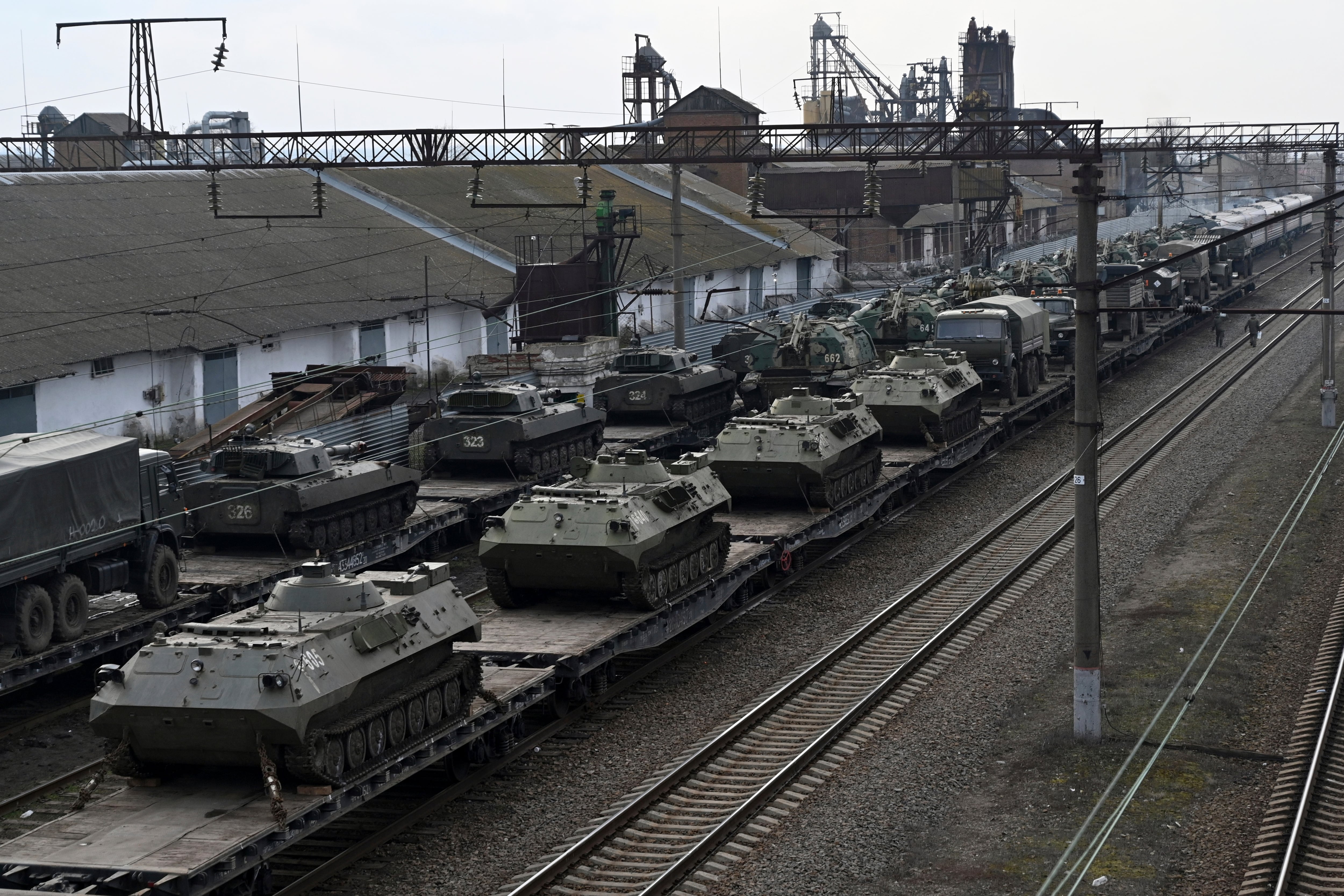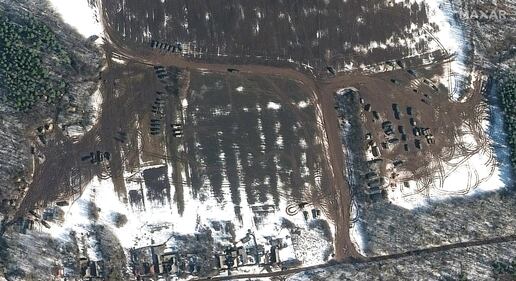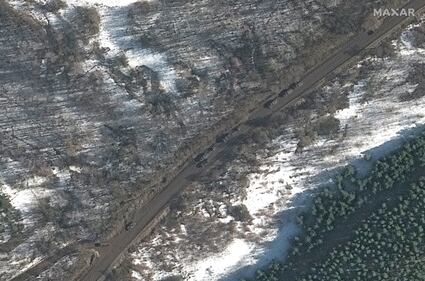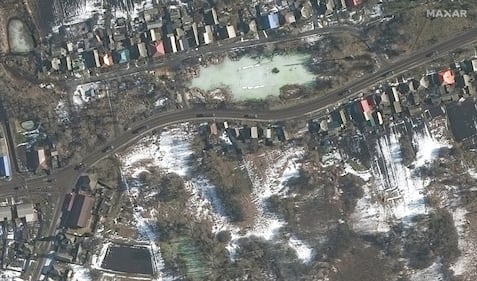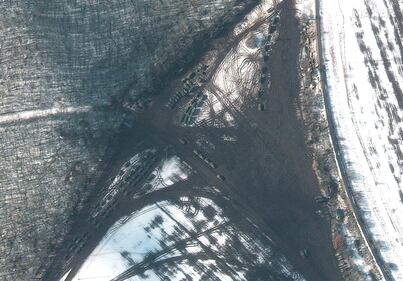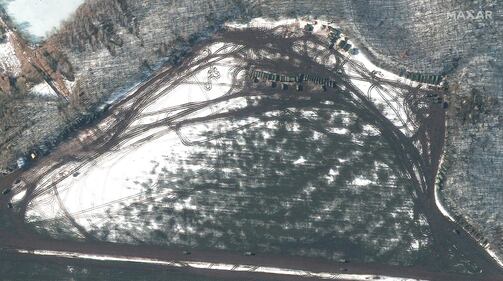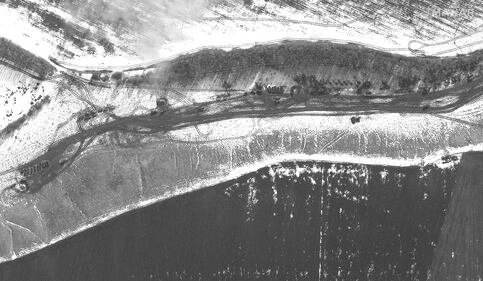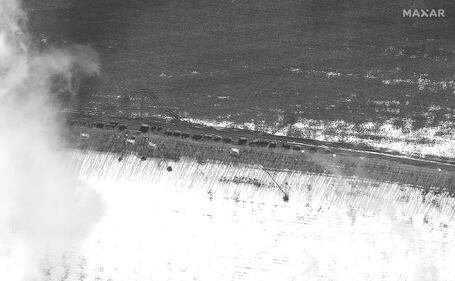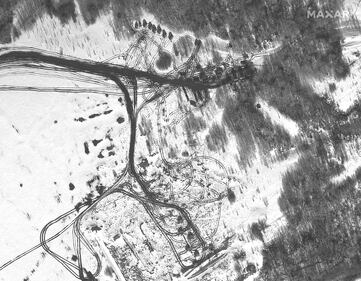The latest on the Russian attack on Ukraine:
Russian troops launched their anticipated attack on Ukraine on Thursday, as President Vladimir Putin cast aside international condemnation and sanctions, warning other countries that any attempt to interfere would lead to “consequences you have never seen.”
Big explosions were heard before dawn in Kyiv, Kharkiv and Odessa as world leaders decried the start of a Russian invasion that could cause massive casualties and topple Ukraine’s democratically elected government.
Ukraine’s border guard agency reported that the Russian military attacked the country from neighboring Belarus.
The agency said the Russian troops unleashed artillery barrage as part of an attack backed by Belarus. They said the Ukrainian border guards were firing back, adding that there was no immediate report of casualties.
Russian troops had deployed to its ally Belarus for military drills, a move that the West saw as a prelude to an invasion of Ukraine. The Ukrainian capital of Kyiv is about 75 kilometers (50 miles) south of the border with Belarus.
As the morning proceeded in Ukraine, the Russian military said it had knocked out Ukraine’s air defense assets and airbases.
The Russian Defense Ministry said the Russian strikes have “suppressed air defense means of the Ukrainian military,” adding that the infrastructure of Ukraine’s military bases has been incapacitated.” It denied the claims that a Russian warplane was shot down over Ukraine.
The Ukrainian military, meanwhile, reported that it has shot down five Russian aircraft while fending off the Russian attack on the country.
The websites of Ukraine’s defense, foreign and interior ministries were unreachable or painfully slow to load Thursday morning after a punishing wave of distributed-denial-of-service attacks as Russia struck at its neighbor, explosions shaking the capital of Kyiv and other major cities.
In addition to DDoS attacks on Wednesday, cybersecurity researchers said unidentified attackers had infected hundreds of computers with destructive malware, some in neighboring Latvia and Lithuania.
U.S. President Joe Biden pledged new sanctions meant to punish Russia for an act of aggression that the international community had for weeks anticipated but could not prevent through diplomacy.
Putin justified it all in a televised address, asserting the attack was needed to protect civilians in eastern Ukraine — a false claim the U.S. had predicted he would make as a pretext for an invasion. He accused the U.S. and its allies of ignoring Russia’s demand to prevent Ukraine from joining NATO and offer Moscow security guarantees, and credulously claimed that Russia doesn’t intend to occupy Ukraine but will move to “demilitarize” it and bring those who committed crimes to justice.
In a written statement Wednesday night, President Joe Biden said Russian President Vladimir Putin would be held accountable for “catastrophic loss of life and human suffering.”
“The prayers of the entire world are with the people of Ukraine as they suffer an unprovoked and unjustified attack by Russian military forces,” Biden said in his message.
“President Putin has chosen a premeditated war that will bring a catastrophic loss of life and human suffering,” said Biden. “Russia alone is responsible for the death and destruction this attack will bring, and the United States and its Allies and partners will respond in a united and decisive way.
“The world will hold Russia accountable,” he said. “I will be monitoring the situation from the White House this evening and will continue to get regular updates from my national security team.”
Biden said that he would meet Thursday “with my G7 counterparts in the morning and then speak to the American people to announce the further consequences the United States and our Allies and partners will impose on Russia for this needless act of aggression against Ukraine and global peace and security. We will also coordinate with our NATO Allies to ensure a strong, united response that deters any aggression against the Alliance. Tonight, Jill and I are praying for the brave and proud people of Ukraine.”
The Pentagon declined comment Wednesday night after the attacks began, deferring to statements press secretary John Kirby made at an earlier briefing.
“We believe that they are now at a state of readiness where they could attack at any time,” Kirby said of the more than 150,000 Russian troops amassed around Ukraine.
The United Nations Security Council quickly scheduled an emergency meeting Wednesday night at Ukraine’s request.
During the meeting, U.N. Secretary-General Antonio Guterres urgently appealed to Putin: “in the name of humanity, bring your troops back to Russia.”
But during that meeting, Putin announced he was launching a “special military operation” into eastern Ukraine.
Guterres later urged the Russian president to withdraw his troops and added: “In the name of humanity do not allow to start in Europe what could be the worst war since the beginning of the century, with consequences not only devastating for Ukraine, not only tragic for the Russian Federation, but with an impact we cannot even foresee in relation to the consequences for the global economy.”
As Russian troops attacked Ukraine, world leaders reacted Thursday with outrage — one called it “an unjustified barbarian act” — and vowed to both tighten sanctions and hold the Kremlin accountable.
The turmoil from the beginning of a long-feared act of aggression rippled from Europe to Asia. Stock markets plunged, oil prices surged, and European aviation officials warned of a high risk to civilian aircraft over Ukraine, reminding air operators that “this is now an active conflict zone.”
As the Russian offensive continued, but a fog of war left many questions unanswered Thursday, Ukrainian leaders were decidedly defiant despite facing a pronounced military disadvantage.
“Putin has just launched a full-scale invasion of Ukraine,” Ukraine Foreign Minister Dmytro Kuleba said in a tweet. “Peaceful Ukrainian cities are under strikes. This is a war of aggression. Ukraine will defend itself and will win. The world can and must stop Putin. The time to act is now.”
A full-blown Russian invasion could cause massive casualties and topple Ukraine’s democratically elected government. And the consequences of the conflict and resulting sanctions levied on Russia could reverberate throughout the world, affecting energy supplies in Europe, jolting global financial markets and threatening the post-Cold War balance on the continent.
Putin announced the military operation after the Kremlin said rebels in eastern Ukraine asked Russia for military assistance to help fend off Ukrainian “aggression.” The announcement immediately fueled fears that Moscow was offering up a pretext for war, just as the West had warned.
Putin said he had decided to conduct a “special military operation to protect Donbass.”
He called on the Ukrainian military to “immediately lay down their arms and go home” and added that “Russia’s plans do not include the occupation of Ukraine.”
“We will strive for the demilitarization and denazification of Ukraine,” he said.
A short time later, the Ukrainian president, Volodymyr Zelenskyy, rejected Moscow’s claims that his country poses a threat to Russia and said a Russian invasion would cost tens of thousands of lives.
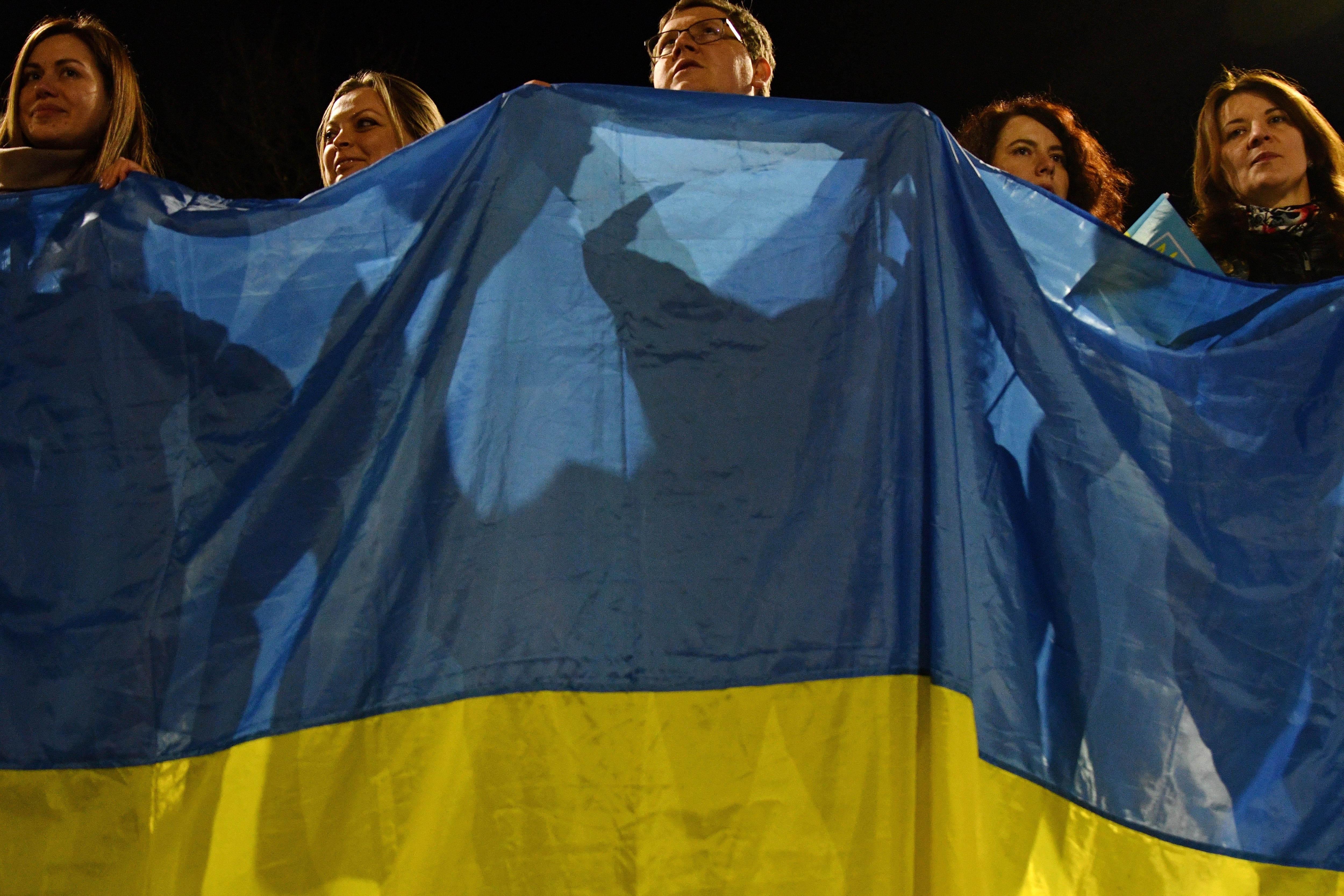
“The people of Ukraine and the government of Ukraine want peace,” President Zelenskyy said in an emotional overnight address, speaking in Russian in a direct appeal to Russian citizens. “But if we come under attack, if we face an attempt to take away our country, our freedom, our lives and lives of our children, we will defend ourselves. When you attack us, you will see our faces, not our backs.”
Zelenskyy said he asked to arrange a call with Russian President Vladimir Putin late Wednesday, but the Kremlin did not respond.
In an apparent reference to Putin’s move to authorize the deployment of the Russian military to “maintain peace” in eastern Ukraine, Zelensky warned that “this step could mark the start of a big war on the European continent.”
“Any provocation, any spark could trigger a blaze that will destroy everything,” he said.
RELATED
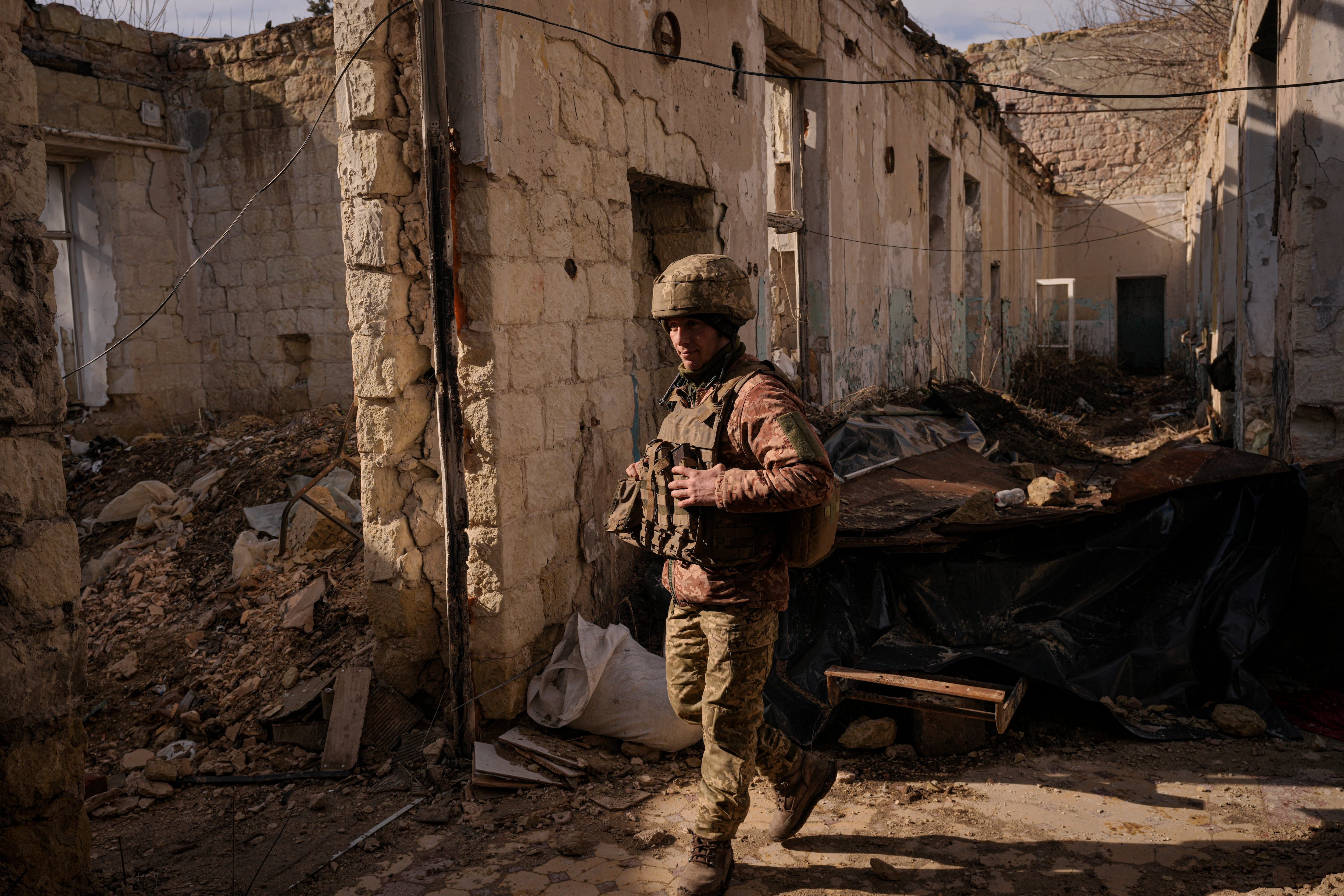
He challenged the Russian propaganda claims, saying that “you are told that this blaze will bring freedom to the people of Ukraine, but the Ukrainian people are free.”
At Wednesday night’s U.N. Security Council meeting, Ukrainian Foreign Minister Dmytro Kuleba called the separatists’ request “a further escalation of the security situation.”
Anxiety about an imminent Russian offensive against its neighbor soared after Putin recognized the separatist regions’ independence on Monday, endorsed the deployment of troops to the rebel territories and received parliamentary approval to use military force outside the country.
Kremlin spokesman Dmitry Peskov said the rebel chiefs wrote to Putin on Wednesday, pleading with him to intervene after Ukrainian shelling caused civilian deaths and crippled vital infrastructure.
White House press secretary Jen Psaki said the separatists’ request for Russian help was an example of the sort of “false-flag” operation that the U.S. and its allies have expected Moscow to use as a pretense for war.
“So we’ll continue to call out what we see as false-flag operations or efforts to spread misinformation about what the actual status is on the ground,” she said.

Earlier Wednesday, Ukrainian lawmakers approved a decree that imposes a nationwide state of emergency for 30 days starting Thursday. The measure allows authorities to declare curfews and other restrictions on movement, block rallies and ban political parties and organizations “in the interests of national security and public order.”
The action reflected increasing concern among Ukrainian authorities after weeks of trying to project calm. The Foreign Ministry advised against travel to Russia and recommended that any Ukrainians who are there leave immediately.
RELATED
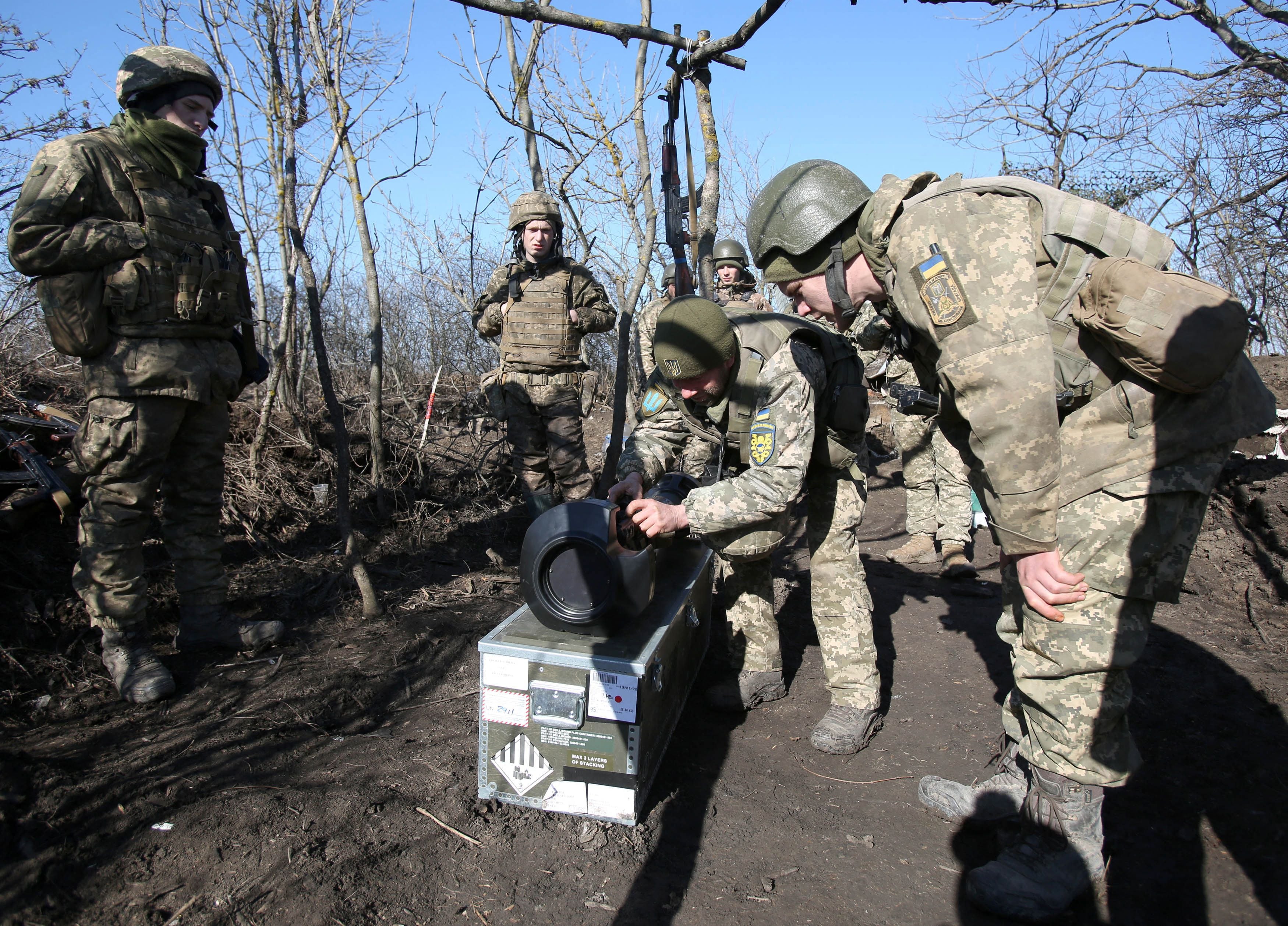
“For a long time, we refrained from declaring a state of emergency ... but today the situation has become more complicated,” Ukrainian National Security and Defense Council head Oleksiy Danilov told parliament, emphasizing that Moscow’s efforts to destabilize Ukraine represented the main threat.
Pentagon press secretary Kirby said this week the Russian force of more than 150,000 troops arrayed along Ukraine’s borders is in an advanced state of readiness. “They are ready to go right now,” Kirby said.
The latest images released by the Maxar satellite image company showed Russian troops and military equipment deployed within 10 miles of the Ukrainian border and less than 50 miles from Ukraine’s second-largest city, Kharkiv.
Image 0 of 10
Early Thursday, airspace over all of Ukraine was shut down to civilian air traffic, according to a notice to airmen. A commercial flight tracking website showed that an Israeli El Al Boeing 787 flying from Tel Aviv to Toronto turned abruptly out of Ukrainian airspace before detouring over Romania, Hungary, Slovakia and Poland. The only other aircraft tracked over Ukraine was a U.S. RQ-4B Global Hawk unmanned surveillance plane, which began flying westward early Thursday after Russia put in place flight restrictions over Ukrainian territory.
Another wave of distributed-denial-of-service attacks hit Ukraine’s parliament and other government and banking websites on Wednesday, and cybersecurity researchers said unidentified attackers had also infected hundreds of computers with destructive malware.
Officials have long said they expect cyberattacks to precede and accompany any Russian military incursion, and analysts said the incidents hew to a nearly two-decade-old Russian playbook of wedding cyber operations with real-world aggression.
In other developments, Russia evacuated its embassy in Kyiv; Ukraine recalled its ambassador to Russia and considered breaking all diplomatic ties with Moscow and dozens of nations further squeezed Russian oligarchs and banks out of international markets.
President Joe Biden allowed sanctions to move forward against the company that built the Russia-to-Germany Nord Stream 2 gas pipeline and against the company’s CEO.
“As I have made clear, we will not hesitate to take further steps if Russia continues to escalate,” Biden said in a statement.
Germany said Tuesday that it was indefinitely suspending the project, after Biden charged that Putin had launched “the beginning of a Russian invasion of Ukraine” by sending troops into the separatist regions. The pipeline is complete but has not yet begun operating.
Putin said Tuesday that he had not yet sent any Russian troops into the rebel regions, contrary to Western claims, and Donetsk rebel leader Denis Pushilin insisted Wednesday there were no Russian troops in the region, even though a local council member claimed the previous day they had moved in.
Already, the threat of war has shredded Ukraine’s economy and raised the specter of massive casualties, energy shortages across Europe and global economic chaos.
European Union sanctions against Russia took effect, targeting several companies along with 351 Russian lawmakers who voted for a motion urging Putin to recognize the rebel regions and 27 senior government officials, business executives and top military officers.
The Russian Foreign Ministry has shrugged off the sanctions, saying that “Russia has proven that, with all the costs of the sanctions, it is able to minimize the damage.”
In Ukraine’s east, one Ukrainian soldier was killed and six more wounded after rebel shelling, the Ukrainian military said Wednesday. Separatist officials reported several explosions on their territory overnight and three civilian deaths.
Facing a barrage of criticism at the 193-member United Nations General Assembly, Russia’s U.N. ambassador, Vassily Nebenzia, warned Ukraine that Russia will monitor a cease-fire in the east and emphasized that “no one intends to go softly, softly with any violators.”
“A new military adventure” by Kyiv “might cost the whole of Ukraine very dearly,” he warned ominously.
After weeks of rising tensions, Putin’s steps this week dramatically raised the stakes. He recognized the independence of the separatist regions, a move he said extends even to the large parts of the territories now held by Ukrainian forces, and had parliament grant him authority to use military force outside the country.
Putin laid out three conditions that he said could end the standoff, urging Kyiv to renounce its bid to join NATO, to partially demilitarize and to recognize Russia’s sovereignty over Crimea, the Black Sea peninsula that Moscow annexed from Ukraine in 2014. Ukraine long has rejected such demands.
Litvinova reported from Moscow. Angela Charlton in Paris; Frank Jordans in Berlin; Lorne Cook in Brussels, Vladimir Isachenkov in Moscow, Frank Bajak in Boston, Robert Burns, Matthew Lee, Aamer Madhani, Eric Tucker, Ellen Knickmeyer, Zeke Miller, Chris Megerian and Darlene Superville in Washington contributed.
Howard Altman is an award-winning editor and reporter who was previously the military reporter for the Tampa Bay Times and before that the Tampa Tribune, where he covered USCENTCOM, USSOCOM and SOF writ large among many other topics.
